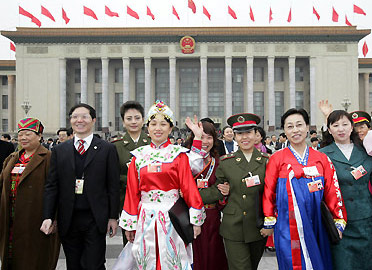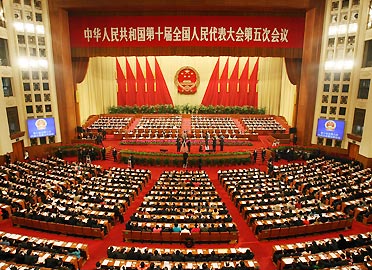| Tools: Save | Print | E-mail | Most Read |
| NPC Ends Annual Session, Adopting Landmark Property, Corporate Income Tax Laws |
| Adjust font size: |
The two laws, granting equal protection to public and private properties and unifying corporate income tax rates for domestic and foreign companies, were adopted by an overwhelming majority vote.
The NPC adopted the corporate income tax law with 2,826 votes for and 37 against, and 22 abstentions, and the landmark property law with 2,799 votes for and 52 against, and 37 abstentions.
NPC Standing Committee Chairman Wu Bangguo hailed the session as "a great success" at the closing meeting.
Observers said the laws are a positive step forward, and will help drive the reform and opening-up of the country.
The property law shows the spirit of progress, since it protects the order of the socialist market economy and grants equal protection to public and private property, said Wang Shengming, vice head of the Commission of Legislative Affairs of the NPC Standing Committee.
Liu Hezhang, a member of the NPC Standing Committee, said the passing of the property law is an indicator that China will not start a new round of the "capitalism or socialism" dispute.
Meanwhile, Lu Jianzhong, NPC deputy and chairman of Shaanxi Jiaxin Group, said the corporate income tax law, which puts domestic and foreign-funded enterprises on an equal footing for income taxes for the first time since China's opening up began in 1978, brings China's economy more in line with international practices.
The NPC deputies on Friday also approved reports on government work, economic and social development, the central and local budgets, the work of the NPC Standing Committee, and the work of the Supreme People's Court and the Supreme People's Procuratorate.
They adopted a resolution on the election of deputies to the 11th NPC and the measures for electing NPC deputies from China's Hong Kong and Macao special administrative regions.
The NPC annual session has received a total of 796 motions, said Sheng Huaren, vice chairman of the NPC Standing Committee.
The NPC is the highest institution through which the Chinese people exercise their state power. All administrative, judicial, procuratorial and military organs and other state-level institutions are responsible to the NPC and supervised by it.
In 1953, China held people's congresses at different levels. In 1954, the First National People's Congress (NPC) was convened, marking the establishment of the people's congress system, which is the fundamental political system in China.
The National Committee of the Chinese People's Political Consultative Conference (CPPCC), China's top advisory body, adopted a political resolution on Thursday at the closing meeting of its annual session to give full support to the government work report by Premier Wen Jiabao, reports on the work of the Supreme People's Court and the Supreme People's Procuratorate, and the draft property right law and the draft enterprise income tax law.
(Xinhua News Agency March 16, 2007) |
| Tools: Save | Print | E-mail | Most Read |
 |
| Related Stories |
|
Product Directory China Search |
Country Search Hot Buys |



